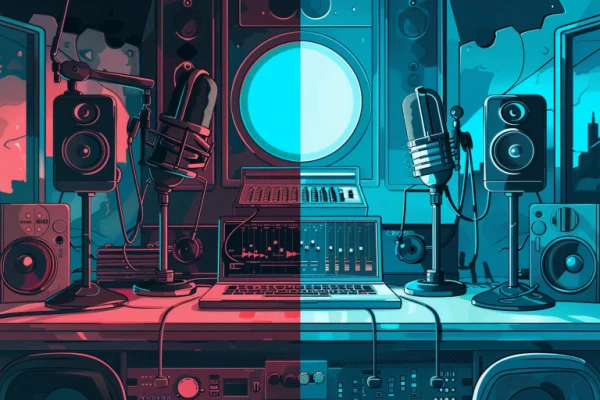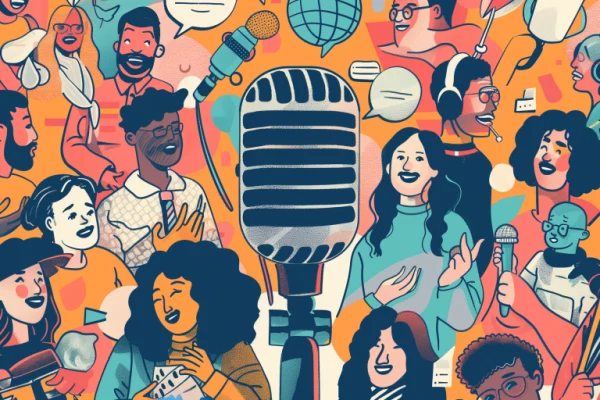Artificial intelligence (AI) has emerged as a disruptive force in various industries, transforming the way we operate and consume information. At the heart of this technological revolution lies the ability of machines to learn, adapt, and autonomously perform complex tasks.
In this context, the world of podcasting has not been immune to the advancements of artificial intelligence, which has arrived to offer new possibilities and improve the production and consumption experience of content.
A brief explanation of what artificial intelligence is and its growing relevance in various industries.
Artificial intelligence refers to the ability of machines to mimic human reasoning and perform specific tasks that traditionally require human intervention.
This includes machine learning, where machines can improve their performance without direct human intervention. In recent years, AI has gained ground across diverse industries, from healthcare to manufacturing, driving efficiency and significant advancements.
Within the context of podcasting, artificial intelligence emerges as an innovative tool to optimize both production and listener experience. Its ability to swiftly and accurately analyze vast datasets has opened new possibilities for continuous improvement and customization.
General introduction on how AI can be applied in the world of podcasts
In the realm of podcasting, the application of artificial intelligence encompasses various areas, ranging from production to content distribution and monetization.
The machines' capability to process and analyze data at an unprecedented speed has enabled notable advancements that are reshaping how we create and consume audio content.
For a more detailed understanding, it's worth exploring how this technology has been integrated into podcast production.

Enhancement of podcast production and editing with AI
Podcast production and editing are fundamental elements for delivering quality content to listeners. Artificial intelligence has introduced significant advances in this area, simplifying tasks that used to require considerable time and specialized technical skills.
Exploration of AI tools aiding in automatic audio editing
Automatic audio editing is one area where artificial intelligence has made a notable impact. AI-based tools can identify and remove unwanted noise, correct awkward pauses, and automatically adjust volume to maintain consistent sound quality throughout the episode.
Some platforms use machine learning algorithms to analyze audio patterns and suggest edits, enabling creators to focus more on podcast content than technical aspects. This not only streamlines the production process but also enhances the final product's quality.
Description of how AI can assist in episode mixing and mastering to improve sound quality
Mixing and mastering are critical processes for achieving exceptional audio quality in a podcast. Artificial intelligence has proven valuable by automating tasks such as equalization adjustments, compression, and leveling..
AI tools can analyze audio content, identify areas needing improvement, and make precise adjustments to optimize sound clarity and coherence. This not only benefits creators with less technical expertise but also elevates the auditory quality of podcasts, providing a more enjoyable experience for listeners.
Incorporating AI into podcast production and editing not only simplifies the process but also allows creators to focus on creativity and content, relying on technology to optimize the technical quality of the final product.
Beyond production, AI also brings additional benefits for both creators and listeners.
Automated transcription and content analysis
Automated transcription and content analysis are crucial aspects in podcast optimization, offering benefits in both accessibility and content comprehension.
Details on using AI to automatically transcribe podcast episodes
Artificial intelligence has revolutionized audio transcription, offering fast and accurate solutions.
AI-based transcription tools use natural language processing (NLP) algorithms to automatically convert spoken speech into written text. This functionality not only facilitates transcript creation for podcast episodes but also enhances accessibility by enabling people with hearing impairments to access the content.
Automatic transcription not only saves time for creators but can also be used to improve content visibility in search engines, as text allows for more effective indexing.
Discussion on AI tools that can analyze podcast content to extract themes, trends, and keywords
AI is not limited to transcription; it can also analyze podcast content to extract valuable information. Content analysis algorithms can identify recurring themes, emerging trends, and specific keywords in episodes.
This benefits creators by providing information on what content resonates best with the audience and enhances the listener experience by enabling episode searches based on specific topics.
Some platforms use this information to recommend related episodes and provide personalized experiences.
In summary, artificial intelligence not only facilitates accurate transcription but also adds layers of analysis that enrich both podcast production and consumption of content.
Personalization and AI-based recommendations
Personalization and AI-based recommendations represent a significant evolution in how listeners interact with podcast content. These aspects not only improve the user experience but also enable creators to effectively reach their audiences.
Description of how AI can be used to personalize the listener experience
Artificial intelligence has enabled deeper personalization of the listener experience.
Some podcast platforms use machine learning algorithms to analyze users' listening history and understand their preferences. With this information, AI can personalize content recommendations, suggesting episodes aligned with each listener's specific interests.
This personalization not only enhances listener satisfaction but can also increase retention and engagement.
AI continuously adapts to changes in listening patterns, ensuring recommendations remain relevant over time.
Examples of podcast platforms using AI algorithms to suggest relevant episodes to users
Various leading podcast platforms are already implementing AI-based personalization.
Notable examples include recommendation algorithms on platforms like Spotify, Apple Podcasts, and YouTube Music. These algorithms analyze not only individual preferences but also global listening patterns to offer precise and relevant suggestions.
The successful implementation of AI-based personalization benefits listeners by providing tailored content and presents opportunities for creators to enhance the visibility of their episodes..
Furthermore, artificial intelligence can assist in targeted advertising and monetization, further influencing the podcasting business model."

Targeted advertising and monetization through AI
Targeted advertising and monetization are critical aspects for the sustainable success of podcasts. Artificial intelligence has introduced significant innovations in these areas, allowing creators to maximize their revenue and advertisers to effectively reach specific audiences.
Explanation of how AI can help in more effectively targeting advertisements based on listener behavior analysis
Artificial intelligence has transformed the way advertising is approached in podcasts.
By analyzing listener behavior, AI can identify patterns and preferences, allowing for more targeted and personalized advertising. This translates to ads that are more relevant to the audience, increasing the likelihood of interaction and conversion.
AI-based advertising platforms can segment audiences based on various criteria such as location, content preferences, and listening behaviors. This provides advertisers with an unprecedented ability to reach specific demographic groups, maximizing the impact of their campaigns.
Description of monetization models benefiting from using AI to optimize podcast creators' revenue
Artificial intelligence has also influenced monetization models, enabling creators to diversify and maximize their revenue sources.
Some monetization models benefiting from AI include:
- Programmatic advertising: AI facilitates automated buying and selling of ad space, adjusting in real-time to audience characteristics.
- Personalized sponsorships: AI-based recommendation algorithms can suggest sponsors and partnerships that better align with the podcast content and audience.
- Subscription payments: AI-based personalization can offer exclusive content to subscribers, increasing value proposition and audience retention.
AI, by optimizing advertising effectiveness and providing new monetization opportunities, is contributing to making podcast creation more sustainable and profitable for creators.
However, there are several challenges regarding ethical considerations associated with the use of artificial intelligence in podcasting.
Challenges and ethical considerations
While artificial intelligence has brought numerous benefits, its implementation is not without technical challenges and ethical considerations that require careful attention.
Discussion on technical challenges in using AI
- Accuracy and Reliability: Despite significant advancements in AI tools, there's still a possibility of errors, especially in tasks like transcription and content analysis. Accuracy and reliability are critical aspects that need addressing to ensure the quality of content generated by AI.
- Complex Integration: Effective implementation of artificial intelligence in podcast production may require complex integration with existing platforms. Creators need to overcome potential technical obstacles and ensure seamless integration of AI tools into their workflows.
Ethical considerations in AI use in podcasting
- Data privacy: Data collection and analysis for personalized user experience and targeted advertising raise concerns about privacy. It's essential for creators and platforms to implement robust measures to protect listeners' personal information.
- Transparency and authenticity: Listeners should be informed about the use of artificial intelligence in content production and recommendation. Transparency is key to building listener trust and ensuring they understand how AI is used in the creative process.
- Fairness and bias: AI algorithms may inherit biases present in the data they're trained on. This could result in biased recommendations or unintentional exclusion of certain groups. Creators must actively work to mitigate these biases and ensure fairness in the user experience.
In summary, while artificial intelligence offers exciting opportunities, its implementation requires careful consideration of associated technical and ethical challenges. Creators and platforms should advocate for responsible practices that balance innovation with privacy protection and fairness in the listener experience.
The future integration of various artificial intelligence tools in podcasting will shape an industry vastly different from what we currently know.
The future of podcasting with AI
So far, we've explored how artificial intelligence has transformed podcasting in various areas, from production and editing to personalized listener experiences and monetization.
Now, in addressing the future of podcasting with AI, we can reflect on the continued potential of this technological symbiosis.
Thoughts on the potential of AI to revolutionize podcasting
Artificial intelligence is constantly evolving, and its role in podcasting is only beginning to reveal its true potential. As AI technologies advance, we're likely to see significant improvements in transcription accuracy, listener experience personalization, and the effectiveness of targeted advertising.
Machines' ability to continuously learn will allow for more refined adaptation to changing audience tastes and preferences. Additionally, new innovations might emerge, such as AI-assisted content creation or predictive analysis tools to anticipate emerging podcasting trends.
Perspectives on how AI could influence the future development of podcasts
- Greater accessibility: AI could play a crucial role in making podcast content even more accessible to diverse audiences, including those with disabilities.
- Creative collaboration: We'll witness increased collaboration between human creators and AI tools, potentially leading to new storytelling forms and immersive experiences.
- Innovation in Monetization Models: AI could introduce more sophisticated monetization models, leveraging precise audience data to offer more specific and effective advertising opportunities.
- Continuous content refinement: AI-based recommendation algorithms will continue to refine, offering more accurate and relevant suggestions, further enhancing the listener experience.
Ultimately, podcasting with artificial intelligence appears as an exciting and dynamic space.
As technology advances, creators and platforms embracing these innovations will be better positioned to offer quality content and meet rising audience expectations.
However, while all this seems promising, the relationship between podcasting and artificial intelligence is just beginning. Undoubtedly, we will all witness an evolution that will leave us astonished."
About the author
Content Manager at Mumbler.
Podcaster and content creator.
Passionate about communication and a fan of the WordPress community.
I talk about movies and series on Babel Infinito.
I talk about podcasting on Todo por Un Podcast.








